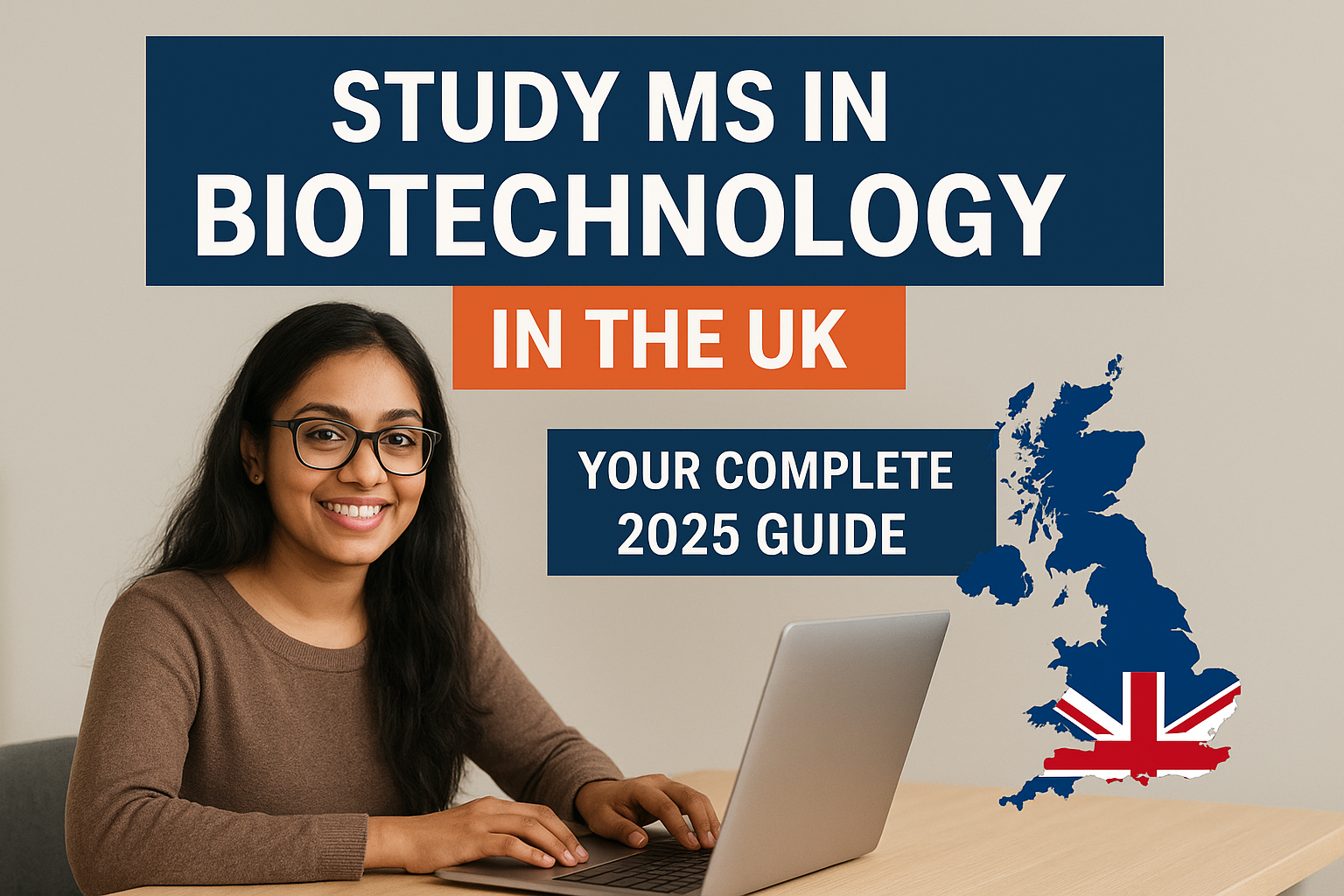Call Us:+91-9920234749, +91-9833420909 info@studyandworkabroad.in

Study MS in Biotechnology in the UK – Your Complete 2025 Guide
Biotechnology is one of the fastest-growing and most impactful industries in the UK, contributing significantly to the economy through innovations in healthcare, agriculture, environmental sustainability, and genetic research. With over 5,000 biotechnology companies and research organizations operating across the country, the UK is a global leader in fields like gene therapy, vaccine development, and bioengineering.
For ambitious students, pursuing a Master’s in Biotechnology in the UK offers a chance to gain world-class education, hands-on research experience, and direct exposure to one of the most advanced biotech ecosystems in the world.
Why Choose the UK for Your MS in Biotechnology?
Studying biotechnology in the UK goes beyond academic learning. Here’s why it stands out:
- Globally Recognised Degrees – UK universities rank among the top in global biotechnology and life sciences, ensuring your qualification is valued worldwide.
- Cutting-Edge Research Facilities – Students gain access to state-of-the-art labs, advanced technology, and real-world research projects in collaboration with industry partners.
- Industry Links & Internship Opportunities – Strong partnerships between universities and biotech companies create opportunities for internships, placements, and career networking.
- Diverse Career Pathways – Graduates can pursue careers in pharmaceuticals, environmental science, agriculture, R&D, and more.
- Strategic Location – The UK is home to major biotech hubs like the “Golden Triangle” of Oxford, Cambridge, and London, hosting global research centres and innovative start-ups.
Duration of the Course
- Full-time: 1 year
- 2 years the degree is completed with a work placement
Top UK Universities for MS in Biotechnology
Here are some of the leading institutions offering exceptional biotechnology master’s programmes:
- University of Edinburgh – MSc Biotechnology
- University of Birmingham – MSc Molecular Biotechnology
- Imperial College London – MSc Applied Biosciences & Biotechnology
- University of Warwick – MSc Biotechnology, Bioprocessing & Business Management
- University of Leeds – MSc Biotechnology with Business Enterprise
- University of Sheffield – MSc Molecular Biology and Biotechnology
- University of Manchester – MSc Biotechnology & Enterprise
- University of Nottingham – MSc Biotechnology
- University of Glasgow – MSc Biotechnology
Cost of Studying MS in Biotechnology in the UK
- Tuition Fees: £20,000 – £35,000 per year (varies by university and course type)
- Living Costs: £12,000 – £15,000 annually (depending on city and lifestyle)
Many universities, government bodies, and private organizations offer scholarships and funding options to help reduce expenses.
Scholarships for International Students
Some popular scholarships include:
- Chevening Scholarships
- GREAT Scholarships
- Commonwealth Scholarships
- Imperial College London Postgraduate Scholarships
- Research Council UK (RCUK) Funding
- Erasmus+ Programme
- University-specific academic scholarships (Edinburgh, Manchester, Warwick, etc.)
Admission Requirements
While each university sets its own criteria, general requirements include:
- A bachelor’s degree in biotechnology, life sciences, biochemistry, or a related field (2:1 or 2:2 UK equivalent).
- Academic transcripts from all institutions attended.
- English proficiency proof (IELTS 6.0–6.5 / TOEFL 80–90 / PTE equivalent).
- Statement of Purpose (SOP) outlining career goals and motivation.
- Two academic or professional references.
- Updated CV or résumé.
- Some universities may conduct interviews or request GRE scores.
Career Opportunities After MS in Biotechnology
Graduates can explore roles such as:
- Research & Development Scientist
- Pharmaceutical Scientist
- Clinical Research Associate
- Bioinformatics Analyst
- Bioprocess Engineer
- Environmental Biotechnologist
- Quality Assurance/Control Manager
- Regulatory Affairs Specialist
- Biotech Entrepreneur
The UK biotech sector continues to grow, but international students should also consider work visa regulations and post-study stay options.
Post-Study Work Opportunities
International graduates can apply for the UK Graduate Route visa, which allows them to stay for up to 2 years to work or seek employment. Recent changes to immigration rules mean students should check the latest updates before applying.
Subjects Covered in an MS Biotechnology Programme
A typical curriculum includes:
- Genetic Engineering
- Molecular Biology
- Environmental Biotechnology
- Stem Cell Technology
- Bioinformatics
- Drug Development
- Bioprocessing & Industrial Biotechnology
- Biotechnology Ethics & Regulations
How AVF Consultants Can Help You Study in the UK
At AVF Consultants, we understand that applying for a master’s abroad can feel overwhelming—from choosing the right university to securing your visa. Our expert team offers:
- Personalised Counselling: Helping you select universities and courses aligned with your career goals.
- Application Support: Guiding you through SOP writing, document preparation, and meeting deadlines.
- Scholarship Assistance: Identifying and applying for funding opportunities to ease financial stress.
- Visa Guidance: Step-by-step help to meet UK student visa requirements.
- Pre-Departure Briefing: Preparing you for life, study, and work in the UK.
With years of experience in overseas education, AVF Consultants has helped countless students successfully start their journey towards a rewarding global career.
Final Thoughts
An MS in Biotechnology in the UK offers a blend of academic excellence, research opportunities, and industry exposure, making it a smart choice for students aiming to build a career in this dynamic field. However, success depends on choosing the right university, gaining practical experience, and understanding the UK’s post-study work landscape.
By planning ahead and making informed decisions, you can position yourself for a rewarding career in one of the most innovative sectors in the world.
Frequently Asked Questions
1. How long does an MS in Biotechnology in the UK take to complete?
Most programmes take 1 year full-time or 2 years with a work placement option.
2. Do I need work experience to apply?
Not necessarily, but relevant internships or lab experience can strengthen your application.
3. Can I work while studying in the UK?
Yes, international students can work up to 20 hours per week during term time and full-time during breaks.
4. Are UK biotechnology degrees recognised internationally?
Yes, UK degrees are highly respected globally for their academic and research excellence.
5. What are the job prospects after graduation?
You can work in pharmaceuticals, environmental biotech, clinical research, R&D, or even start your own biotech venture.
6. Can I stay in the UK after completing my degree?
Yes, you can apply for the Graduate Route visa to stay for up to 2 years after graduation, and after finding a job, you can extend the visa for another 5 years on the skilled worker visa..



